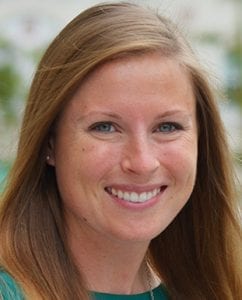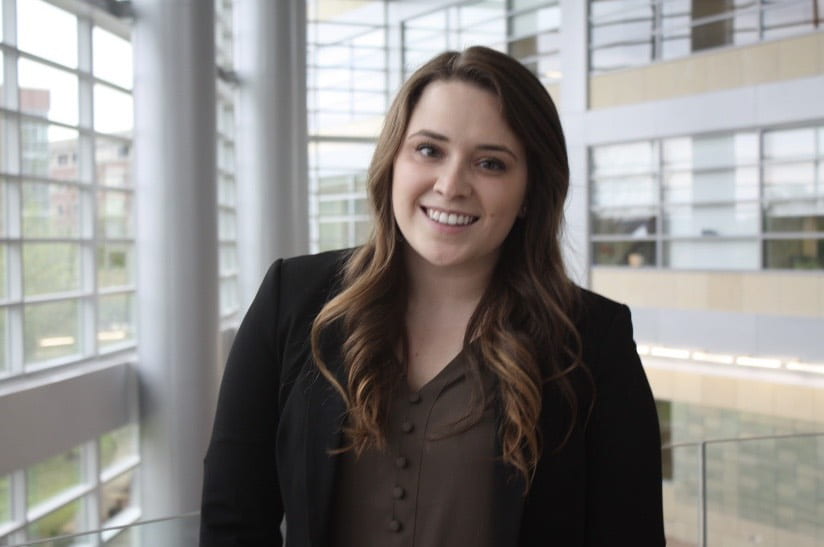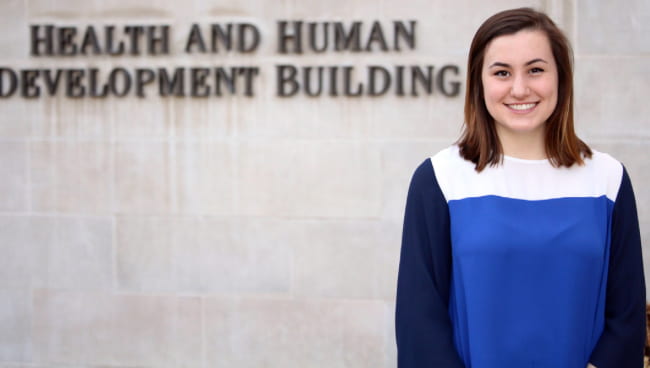We are interested in understanding the connections between stress, affect, health behaviors, including drinking and substance use, in the day-to-day lives of adolescents and young adults.
We use advanced statistical modeling and ambulatory assessment methods, including daily diaries, ecological momentary assessments (EMA), and wearable biosensors in our investigations.
Learn more about our projects.
Current Lab Members
 Michael Russell, Assistant Professor of Biobehavioral Health (PI)
Michael Russell, Assistant Professor of Biobehavioral Health (PI)
Michael Russell, Ph.D. is Assistant Professor of Biobehavioral Health and Faculty Affiliate at The Methodology Center. Dr. Russell’s research is focused on (a) the measurement of alcohol use behavior and intoxication in day-to-day life using transdermal sensors and ecological momentary assessments (EMA), (b) dynamic links between affect and alcohol misuse in naturalistic settings, and (c) using advanced statistical modeling (multilevel modeling, time series, and time-varying effect modeling), to capture within-person change and between-person heterogeneity in affect and alcohol use processes. He is currently leading a data collection effort that combines EMA and wearable biosensors for alcohol intoxication to understand the causes and consequences of young-adult heavy drinking episodes in daily life. Dr. Russell has a strong commitment to teaching and mentoring other health researchers in advanced analytic methods, as evidenced by numerous invited talks and workshops focused on advanced MLM, TVEM, and the analysis of intensive longitudinal data. His work has been published in a variety of top journals, including Annals of Behavioral Medicine, Development and Psychopathology, Journal of Adolescent Health, Prevention Science, Drug and Alcohol Dependence, and Psychology of Addictive Behaviors. See Dr. Russell’s CV for more information.
Rachel Bomysoad, Lab Manager
Rachel joined Penn State as the lab manager for the Alcohol Habits study in August 2018, after receiving her B.S. in Psychology, with minors in Psychiatric Rehabilitation and Criminal Justice, from Drexel University. Rachel’s undergraduate internships throughout outpatient, social service, and correctional facilities in Philadelphia inform her research interests, as she aims to understand substance use behavior and evaluate dynamic areas of risk and protective factors in community and forensic settings.
 Jimikaye Beck Courtney, Postdoctoral Fellow, Prevention and Methodology Training Program
Jimikaye Beck Courtney, Postdoctoral Fellow, Prevention and Methodology Training Program
Dr. Jimikaye Courtney received her Ph.D. in Human Bioenergetics from Colorado State University. She is currently a post-doctoral fellow in the Prevention and Methodology Training (PAMT) program working under Dr. David Conroy and Dr. Michael Russell. Jimikaye’s research is focused on (a) the measurement of physical activity and alcohol use behaviors using wearable monitors and ecological momentary assessment (EMA), (b) examining the relationships between physical activity, alcohol use, and psychosocial predictors of health, such as stress and affect, and (c) using advanced statistical modeling (multilevel modeling, time-varying effect modeling, etc.), to examine the within-person dynamics of the relationships between physical activity, alcohol use, and psychosocial variables, and the within-person dynamics of alcohol use throughout an alcohol use event or a single day of alcohol use. Her postdoctoral training will expand upon these areas of interest by using advanced statistical modeling to examine data captured via the activPAL activity monitor, SCRAM alcohol monitor, and EMA surveys. Her long-term goal is to use information learned through said research to inform the development of real-time adaptive interventions and policy capable of modifying health behaviors to improve human health.
 John Felt, Postdoctoral Fellow, Prevention and Methodology Training Program
John Felt, Postdoctoral Fellow, Prevention and Methodology Training Program
Dr. John Felt received his Ph.D. in Psychological Sciences, with emphases in Health Psychology and Quantitative Methods, from the University of California, Merced. He is currently a post-doctoral fellow in the Prevention and Methodology Training (PAMT) program working under Dr. Joshua Smyth and Dr. Michael Russell. John has dual research interest in distinct but related areas. First, he is interested in the biopsychosocial underpinnings of the relationships between stress and health and well-being. Within this area, John has investigated quality of life issues in patients treated for rare hormonal diseases (e.g., Cushing’s syndrome) and how the stress response alters information processing. Second, John is interested in statistical methods to evaluate change over time, specifically with models relevant to research in stress, health, and well-being. Within this area, John has worked with latent variable and multilevel models, in both the frequentist and Bayesian frameworks. His postdoctoral training will expand upon these areas of interest by incorporating methods to study psychological processes in the moment (i.e., through EMA methods) and by studying the statistical methods relevant for the intensive longitudinal data that these methods yield (e.g., multilevel modeling, generalized additive models, etc.).
Emily Fair, 3rd year Biobehavioral Health Graduate Student
Emily is a 3rd year Ph.D. student in Biobehavioral Health and has been working with Dr. Russell since 2018. She received her B.A. in Psychology from Georgetown University, her M.A. in Thanatology from Hood College in 2016, and her M.A. in Psychology from The Catholic University of America in 2018. Emily’s research focuses on the influence of interoception (perception of bodily state) on affect and behavior. Emily is interested in understanding this relationship in the context of bodily states such as subjective intoxication and within the context of chronic diseases such as addiction. Emily is interested in a broad range of methodologies to investigate these associations, such as ambulatory assessment, Bayesian statistics and methods that blend person-specific time series modeling and group-level inference from person-specific results.
 Molly Boyko, Undergraduate Research Assistant
Molly Boyko, Undergraduate Research Assistant
Molly is a senior majoring in Biological Sciences and Health Professions. She joined the research team in the Fall of 2019 and has been working hands on with her fellow researchers and participants ever since. In the future, she plans on attending medical school to receive her Doctorate in Dermatology as she has always had an interest in the field.
Nicole Cantor, Undergraduate Research Assistant
Nikki is a senior Biobehavioral Health student at Penn State, who joined the lab in Fall 2019.
Lab Alumni
Devanshi Agnihotri, B.S. in Health Policy and Administration, 2020
Devanshi majored in Health Policy Administration, minoring in Chinese and Information Sciences and Technology at Penn State. She was involved in the SCRAM lab for 2 years and various activities, including Schreyer Consulting Group and teaching assistants for Statistics and Biology. In addition to the SCRAM lab, she also enjoyed researching in the Health Policy Research labs as well. In her free time, she likes spending time with her friends and ice skating.
Jessica Braymiller, Ph.D., 2019
Jessica Braymiller is currently completing a post-doctoral fellowship at the University of Southern California after receiving her PhD in Biobehavioral Health at Penn State in 2019. She received her B.A. in Psychology from Mercyhurst University in 2014 and her M.S. in Biobehavioral Health from Penn State in 2016. Jessica’s research focuses on integrating innovative statistical methods with the study of substance use behaviors during adolescence and young adulthood. Specifically, she is interested in understanding how electronic nicotine delivery system use (i.e., vaping) is related to other tobacco product use, as well as marijuana and alcohol use. Jessica uses time-varying effect modeling to examine how these associations vary by age and change over time. She also incorporates latent class models to examine comprehensive patterns of substance use behaviors.
Cara Casilli, B.S. in Biobehavioral Health, 2018
Kristin Dolenti, B.S. in Biobehavioral Health, 2018
Meghan Eglington, B.S. in Biobehavioral Health, 2020
Meghan studied Biobehavioral Health in the College of Health and Human Development at Penn State. She joined the research team in the Spring of 2018 and has enjoyed working with the research assistants and coordinators every day since! She plans to apply to Physician’s Assistant programs after graduating and is grateful for her research experience pushing her closer to her future career.
 Jamie Gajos, Ph.D., Postdoctoral Fellow, 2019
Jamie Gajos, Ph.D., Postdoctoral Fellow, 2019
Jamie is currently an assistant professor of human development and family studies at the University of Alabama, after completing her Postdoctoral Fellowship with the Prevention and Methodology Training (PAMT) program in 2019. She received her Ph.D. in Criminology and Criminal Justice from Florida State University in 2017. Jamie’s specific research agenda seeks to understand how substance use, problem behaviors, and mental health outcomes manifest across time within the context of important proximal social environments. Jamie examines these dynamic person-environment relationships with ecological momentary assessment (EMA) data and uses statistical methods like time-varying effect modeling and multilevel modeling approaches to gain a greater understanding of both temporal dynamics and within-person processes. Jamie has collaborated with Michael Russell, H. Harrington Cleveland, and David Vandenbergh on this work.
Gabrielle Genetelli, B.S. in Biobehavioral Health, 2018
Sarah Gioia, 4th year Biobehavioral Health Graduate Student
After earning her B.A. in Psychology from Penn State in 2014, Sarah has returned to her alma mater. She is currently a fourth year Biobehavioral Health graduate student, studying under the guidance of Dr. Joshua Rosenberger. In the years in between, she has supported research teams in health care and APA accreditation. Most recently, she worked for the American Psychological Association as a legislative assistant, where her team used psychological science to inform federal policy and legislation. Currently, Sarah studies discrimination in healthcare towards racial and sexual minorities and aims to understand how these discriminatory experiences can impact health over time.
 Elle Jablon, B.S. in Biobehavioral Health, 2020
Elle Jablon, B.S. in Biobehavioral Health, 2020
Elle majored in Biobehavioral Health and minored in Biology at Penn State. She worked in this lab since Spring 2018. Her future career goal is to attend pathologists’ assistant school. Elle also served as a special events THON committee member and a volunteer at Mid-State Literacy Council where she taught English to immigrants.
 Hio Wa (Grace) Mak, Ph.D., 2019
Hio Wa (Grace) Mak, Ph.D., 2019
Hio Wa received her Ph.D. in Human Development and Family Studies at Penn State in 2019. She will be starting as a postdoctoral scholar at the Dornsife Center for Self-Report Science at the University of Southern California. Her research interest focuses on understanding the influence of family and peer processes on adolescent emotion regulation processes, depressive symptoms, and substance use. She is also interested in using different metrics to quantify emotion dynamics (e.g., emotion levels, emotion lability, emotion network density) that resemble real-life emotion processes and their relations to mental health. Methodologically, she is interested in applying innovative research methods, including multilevel modeling (MLM), time-varying effect modeling (TVEM), and structural equation modeling (SEM) to study these developmental processes as they unfold in micro (e.g., momentary) and macro (e.g., yearly) timescales.
Chrissie Shin, B.S. in Biobehavioral Health, 2020
 Jessica Unell, B.S. in Biobehavioral Health, 2019
Jessica Unell, B.S. in Biobehavioral Health, 2019
As an undergraduate at Penn State, Jessica majored in Biobehavioral Health with a minor in Biology. She served as a research assistant in the lab for two years, since the Alcohol Habits study began. In the future, she plans on getting a Master of Science degree in Physician Assistant Studies, and becoming a physician assistant upon completion. In this field, she wishes to practice medicine in underserved populations.



